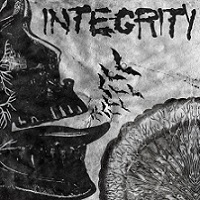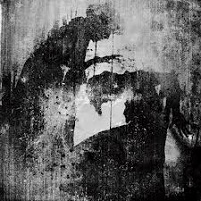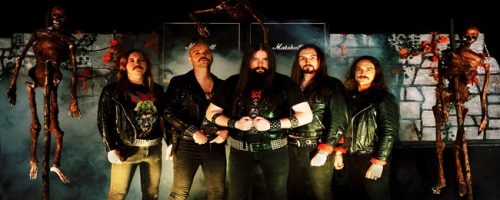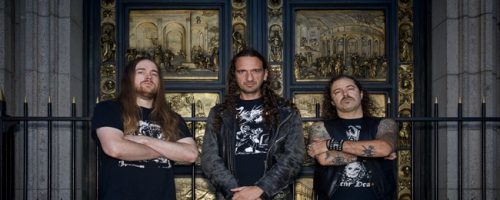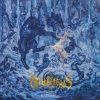Integrity – Esoteric Nightmares
Friday, 14th July 2017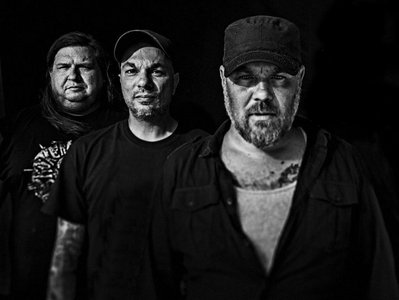
When it comes to hardcore/metal acts, Integrity usually stands as one of the first names out of the mouth. And for good reason. Established all the way back in 1998, they no doubt pioneered the early landscape of the genre, and while there may have been a long list of members to come in and out of the band, vocalist Dwid Hellion’s vision still stands true almost 30 years later. The band’s twelfth album, and first for Relapse Records, Howling, For the Nightmare Shall Consume, continues their legacy of uniquely styled metallic hardcore. We were able to speak with Hellion himself to discuss the band’s iconic skull logo, the band’s outcast status, moving to Belgium, and much of their new album.
Dead Rhetoric: Howling, For the Nightmare Shall Consume is your 12th full-length album. What do you feel makes it stand out among your discography?
Dwid Hellion: That’s a tough question. I guess we really just worked on making an album we would want to hear. We don’t think about it in the context of it being the 10th-11th-12th album, it was just something we wanted to listen to. We thought that these were aspects of music we like – it’s not as basic as that, but that’s pretty much the approach.
Dead Rhetoric: As you’ve continued to make music, do you feel that’s kind of become your mentality? If you are going to put something out, it’s going to be something that you would want to hear…
Hellion: That’s always been the approach for Integrity since the beginning. We were outcasts/outlaws in the musical scene of whatever genre they want to pull us into. We did what we wanted to do; whether people or liked it or not, we didn’t really care. That’s okay with me…I like that. It gives me more of a good scope on how I create these songs. That’s important to me. I want to make songs that I would like to hear. I don’t really care what’s going on in popular culture or radio, I just care about what I like. Sometimes I’m lucky enough that other people also like these songs…and sometimes they don’t. And that’s okay too.
Dead Rhetoric: Listening to the album, it feels like some of the slower tracks almost have a blues-y feel to them at times. Is that a fair assessment?
Hellion: I would hope so. The idea is that the album is one that you can listen to as one long song. The differences in genre and influences would not really be a factor if you listen to it as a big, long song. But I can see what you mean. Blues was where I started out with music. I think a lot of older people started out with music from the blues, and that’s where I started. Blues is the first music that sold their soul to the Devil…Robert Johnson at the “Crossroads.” Blues plays an integral part in the album.
Dead Rhetoric: You originally came from the US, what motivated the move over to Belgium?
Hellion: I moved here about 15 years ago. I was living in America and things were very accepting….too accepting and too generous. I wanted something that would be more “normal.” I wanted something that was a little more real. After I had a few records and people had gotten the wrong impression of me, they wanted me to be a guy who maybe gets first in line at the club, and that sort of thing. I wasn’t really that guy. I like to just disappear into the crowd a bit, experience the crowd, and do my thing. When I moved over here, it was a nice change.
Dead Rhetoric: You mentioned that the band were kind of outcasts or black sheep. Where did that notion stem from?
Hellion: Initially, we were punk/heavy metal guys, so we got the idea that we were outcasts. But when we started playing shows, we were reassured that we were outcasts and we were not accepted by the punk or metal crowd. So we just played music anyways, we didn’t care. For years and years and years, people were angry that we weren’t doing what everyone else was doing. Eventually our first records caught up to us and people said, “wow, these are good records” and they liked them. Initially, they didn’t like them, including Maximum Rock N Roll. I think we are the only band in Max Rock N Roll’s history that they reviewed it as shit, and one year later, reviewed it as real good. Not that it means that it was real good, but it was a special thing for them to recant their negative ruling on the album.
Dead Rhetoric: Being the only real consistent member of the band over the years, what motivates you to carry on with Integrity?
Hellion: I think this curse of the band is something that lingers within me. I guess I should have probably changed the name or whatever, years ago. But I never thought about that. The guys that were in the band, they have come and gone, and most of the time they’ve left because they wanted to make different kinds of music. Sometimes people were kicked out, but for the most part, they left because they wanted to do something else. As far as I go, it’s just a voice in the darkness that’s trying to find answers, but I’m not so sure if I can find them. But I’m looking for them.
Dead Rhetoric: Do you feel that the band was ahead of the curve if you look at how the music shifted, particularly hardcore into metalcore? Or does it just lean back into ‘doing what you wanted to do?’
Hellion: I don’t know, it doesn’t matter to me, this genre thing. I think that those bands that people consider more to be metalcore, they have a different quality to them than us. But if people want to like it that’s okay. I think Integrity is something more esoteric. The whole thing of genres, names, titles…I don’t understand that stuff. I’m interested in a lot of different kinds of music and a lot of different styles. To pigeon-hole it down like that is confusing to a guy like me. It seems to be a funny point of context.
Dead Rhetoric: Has being involved with your own record label [Holy Terror Records], did that ever impact the way you look at your own band?
Hellion: Not really. For the most part, with my record label…I don’t really do records anymore, I haven’t done them in a few years because the postage is too much. But no, I sort of thought of it as an extension of things that I liked. I looked at it as I was lucky enough to have the money to put out some records. I put out records of bands that I liked, people that I thought were deserving of being heard and that’s it.
Dead Rhetoric: What made you decide to sign to Relapse Records?
Hellion: Relapse sent us a generous offer and we were very flattered that they were interested in us. They said that we had total creative freedom. That was all we really needed. We would still do records without any label, but Relapse seemed to be a nice place to see where we could sit after 30 years with the band.
Dead Rhetoric: Do you feel that the Integrity skull logo has been a help in promoting the band over the years?
Hellion: I would hope so. The skull logo is an homage to Danzig, The Misfits, Samhain, and all of that. They were my heroes as a child, and the idea of a cartoon skull logo came from that initially. I would hope that the skull could represent something to the people. That people could relate to the band and to the entire concept of what we are trying to do.
Dead Rhetoric: Have you found that as the band has progressed, you see a lot of people with those tattooed on their body?
Hellion: Yes, I’ve seen a lot of people with tattoos of the logo. They send them to me on social media and such. It’s very flattering that people are moved enough by the band to get a tattoo. That was the whole point of making the band. To inspire people that directly. What a boost of confidence it is.
Dead Rhetoric: Is there anything you’d like to accomplish with Integrity that you have not been able to do so far?
Hellion: Not really. I’ve done a lot of records and it’s been a pretty flattering situation for all these years, to be honest. To be able to make each record without any confliction or record label telling me what to do, that’s a pretty lucky thing. I’m pretty grateful for what I’ve been able to do. Relapse has been a very generous and accepting label for us. It’s been very nice to work with those guys and for them to give us the freedom to create what we want.
Dead Rhetoric: Any touring plans in the near future?
Hellion: We just did a tour in Europe. It ended about a week ago. We are doing a US show in the fall. Then three days in Japan. We don’t play a lot of shows. We have a lot of personal situations with our lives now that we’ve gotten older.












